Jiu jitsu, as a martial art can be traced back hundreds of years throughout India, China and Japan, and although there is a link between the techniques we see in modern day Brazilian jiu jitsu and the oriental styles of past centuries, the cultures from which they evolved were as far apart physically as they were ideologically. In Brazil, there were no ulterior motives to jiu jitsu, during the 1920s the Gracie family would place regular challenges on newspapers against all other combat styles to test their efficiency against them, to fight, to prove they were better at fighting, the ultimate macho behaviour, this was the latin way not the bushido.
There were a few women, seen in sporadic self defence class videos during the 1930s and 1940s, but none that were allowed to follow through a career in jiu jitsu. A testament of this is the fact that jiu jitsu became a regulated Brazilian sport in 1970, but it took over 15 years for it to open a women’s division. It ultimately happened thanks to the valiant efforts of one very special kind of lady, a lady named Yvone Duarte.
This article here presented, depicts some of the most important personalities we have had in our sport, women Like Yvone, who helped cement jiu jitsu as a leading combat sport, a sport that breaks away from taboos, fears and limitations.
.Yvone Duarte
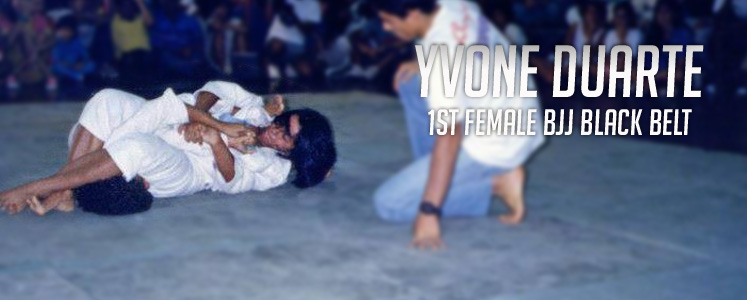 Raised in an all changing decade, Yvone carried with her the free spirit of the 1970’s. Sister to one of the best fighters of the 80’s decade (Pascoal Duarte), Yvone became obsessed with jiu jitsu training alongside her brother at the Osvaldo Alves academy. Though it is often said that Yvone’s greatest achievement in jiu jitsu was that of becoming the first woman to be awarded with a black belt (1990), her contribution to the sport vastly superseded this achievement. Coming from a competitive sporting background, she believed in testing herself, it was this drive that got her knocking on everyone’ door, requesting a female division in the sport. Through her brother’s connections, Duarte managed to convince the Rio de Janeiro federation (FJJERJ) to open the first female division, and the first competition (held in 1985), a competition won by Yvone.
Raised in an all changing decade, Yvone carried with her the free spirit of the 1970’s. Sister to one of the best fighters of the 80’s decade (Pascoal Duarte), Yvone became obsessed with jiu jitsu training alongside her brother at the Osvaldo Alves academy. Though it is often said that Yvone’s greatest achievement in jiu jitsu was that of becoming the first woman to be awarded with a black belt (1990), her contribution to the sport vastly superseded this achievement. Coming from a competitive sporting background, she believed in testing herself, it was this drive that got her knocking on everyone’ door, requesting a female division in the sport. Through her brother’s connections, Duarte managed to convince the Rio de Janeiro federation (FJJERJ) to open the first female division, and the first competition (held in 1985), a competition won by Yvone.
Yvone would not stop here, she was also a pioneer coach, opening her own grappling academy in the late 1980’s, becoming in the process the first woman to open a BJJ academy. She also helped establish the federation of jiu jitsu in Brasilia, capital city of Brazil.
.Rosângela Conceição
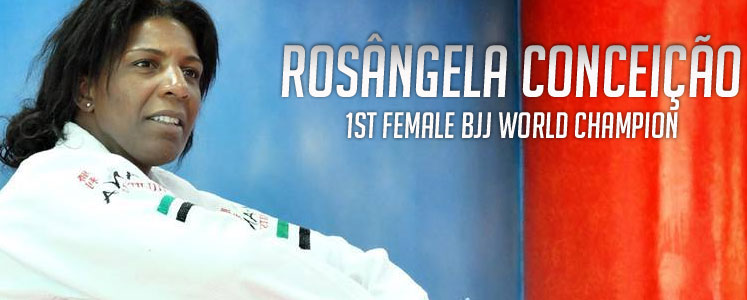
Rosângela Conceição, commonly known as ‘Zanza’ may not be a well known name to most jiu jitsu fans, but she will forever be part of the history of this sport having earned its first female world title (1998). Prior to her world title, Zanza was a well known judo figure. Her relationship with jiu jitsu came through judo. Seeking to improve her ground work for the Olympic sport, she started training BJJ with Ricardo Murgel. Strong and athletic, Rosângela quickly made a name for herself in the sport, conquering the epic ‘Mundial’ gold as a purple belt in an ‘all belts combined’ category.
Unfortunately for our sport, Rosângela Conceição would favor judo over jiu jitsu throughout most of her career, eventually competing for her country at the 2000 Summer Olympics. Always seeking different thrills, in 2003 Conceição started wrestling, quickly becoming one of the top wrestlers in South America. In 2007 Rosângela did the unthinkable, winning the first Pan American medal for Brazil in the sport. She would also compete for her country at the Beijing Olympics in wrestling, having become in the process the most accomplished female wrestler in the history of Brasil.
.Leka Vieira
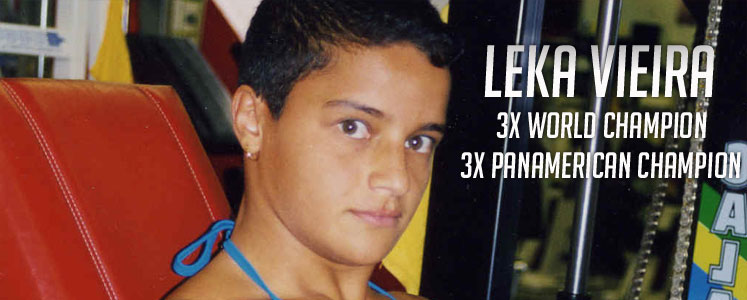
With an impeccable work ethic, Leka ruled the sport by example during her heyday (the late 1990’s and early 2000’s). Born in a place with very few ties to jiu jitsu, the little girl from Minas Gerais became the first female BJJ star, a status that allowed her to move to the United States in 2001 where she helped inspire many more American women, including her student Cindy Omatsu who was the first female outside of Brazil to receive a black belt.
In the process of awarding Omatsu with her black belt, Leka became herself the first woman to award a black belt (the grade was given in partnership with Rigan Machado). Cursed with some bad injuries over the years, Leka’s career was stopped short, but even with a shorter career than most in the sport, Vieira made history and is one of the biggest names in jiu jitsu.
.Leticia Ribeiro
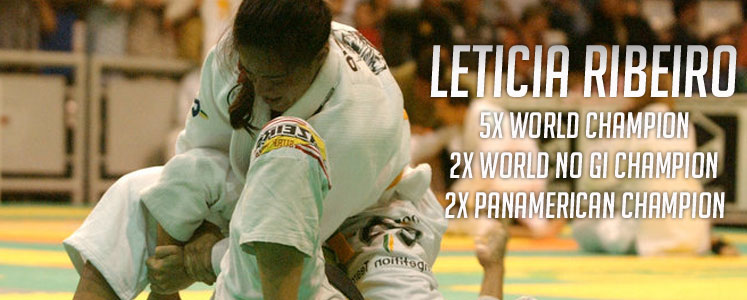
A similar breed of fighter as the aforementioned Leka, Leticia Ribeiro became the face of women’s competitive jiu jitsu for the most part of 10 years.
During the 2000’s decade, Letica managed to achieve a smooth transition between competition and coaching, reaching the best of both worlds. Ribeiro’s female jiu jitsu camp is arguably the best training environment for women around the world, being sought by many of today’s competitors, people such as Bia Mesquita, Michelle Tavares, Mackenzie Dern, Penny Thomas and many others.
.Kyra Gracie
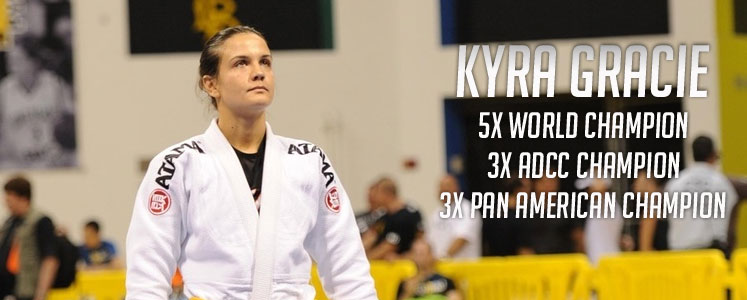
How could there be a list of important jiu jitsu personalities without there being a member of the Gracie family? But don’t be fooled, Kyra’s last name did not earn her numerous accolades, talent and hard work did.
Though Kyra was born with the last name Gracie, becoming a professional athlete in jiu jitsu was not as easy as it may be suggested. Coming from that same long line of latin men we mentioned on the first paragraph of this piece, Kyra had to break the taboos within her own household before she became jiu jitsu’s most recognizable female figure.
Having an impressive competitive record, the Gracie family name, great looks and a charismatic personality, Kyra ticked all the right boxes to become an ambassador of the sport on many different levels, but especially in mainstream media, where she helped raise awareness not only to the female division of jiu jitsu, but to the sport itself.
.Hannette Staack
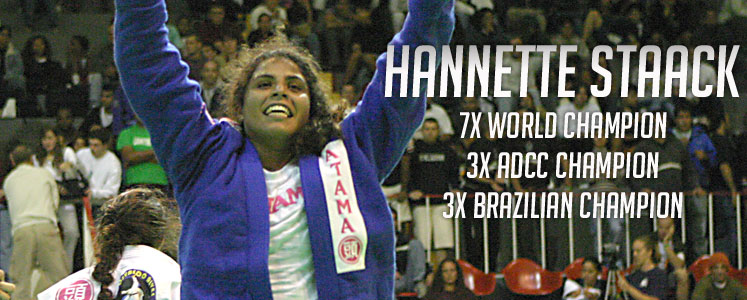
Born in the remote Brazilian state of Maranhão and coming from humble background, Hannette became an example to all young competitors, making a statement for blue collar hard work and a modest demeanor. A true expert in ‘no nonsense’ jiu jitsu, Staack is recognized as one of the legends in the sport and an advocate of the jiu jitsu basics, which earned her 7 world titles in the sport and 3 ADCC titles.
The Brazil 021 team, which Staack co-founded is also well known for it’s work with impoverished areas of Rio de Janeiro.
.Michelle Nicolini
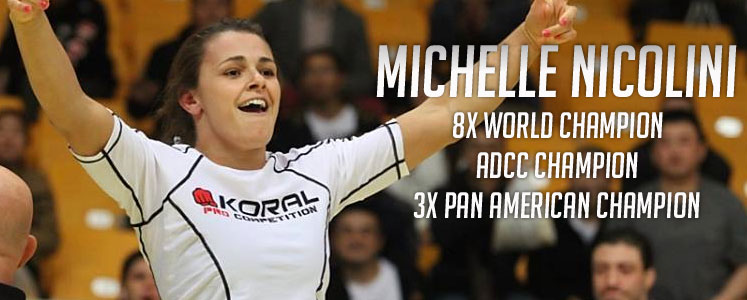
Her talent was discovered by Robert Drysdale, but she truly developed into one of jiu jitsu’s most formidable fighters training under Rodrigo Cavaca’s guidance, winning sequential titles from 2010 to 2014 (the last one no longer training with Cavaca).
Michelle Nicoloni is not only a world title record holder in the female division (a staggering 8 titles), but she won most of those by submission, being one of the sports most accurate finishers. Nicolini also became a synonym of creativity, having developed several position changes from the guard, these were the elements that truly set Nicolini ahead of the pack.
.Gabi Garcia
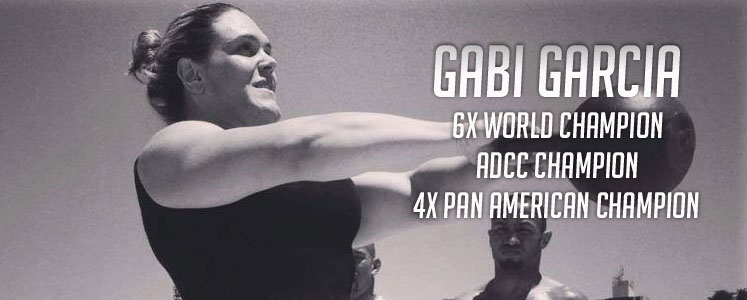
Gabrielle Garcia is currently to women’s jiu jisu what Aleksandr Karelin was to greco-roman wrestling in the 1990’s. A true juggernaut in the women’s open weight division being 6’2″ and over 100kg (221lbs), Garcia had the size advantage but it was her highly commendable work ethic that got Gabi where she is. Gabrielle cleaned out consecutive open weight divisions for years, being arguably the biggest star of the Alliance academy, no small deed in itself considering Alliance is the most successful jiu jitsu academy in the history of the sport.
.Laurence Cousin
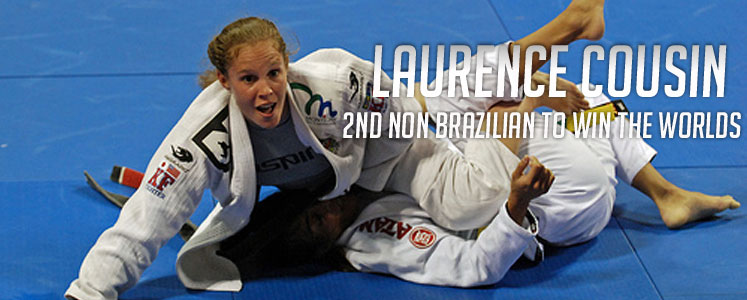
Another inspiring figure of the sport is Laurence Cousin, the first female European black belt was also the second non Brazilian to win a world title at the black belt division (2007), the first being BJ Penn.
Cousin dedicated her life to martial arts, being a black belt also in Aikido by the age of 18, but it was in jiu jitsu that she found her true calling, still competing very regularly 7 years after winning her world title.
.Epilogue
If jiu jitsu in Brazil was built on the backs of unbreakable men who saw jiu jitsu as the ultimate way to test themselves, jiu jitsu women seem to have followed the same path by continuously breaking barriers and molds through their perseverance and technical ability. An example of women perseverance and ability to lead in this sport came through in the highly debated and controversial ‘head gear ban’ imposed by IBJJF (International Brazilian Jiu Jitsu Federation). This rule, which left a large portion of Muslim women outside the sport’s main tournaments due to their ‘hijab’ custom, was changed in 2014 after Caroline de Lazzer led a movement that pressed for IBJJF to allow headgear in competitions. This was an important step for jiu jitsu, considering it is such a big sport in the UAE.
Women like the ones represented on this piece have proven time and again, that in jiu jitsu there are no ‘weaker sexes’, just one very powerful martial art.






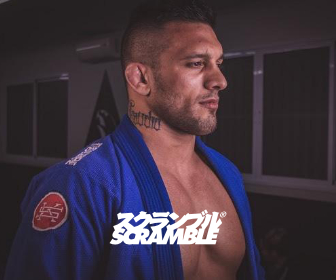
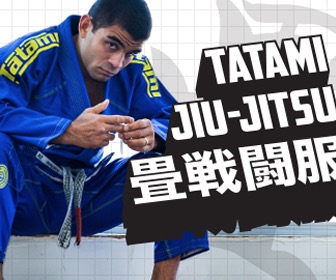








Hello,
Thank you for the “Women Who Changed Jiu-Jitsu” article. I find the piece to be both informative and interesting. I am interested in reaching out to the author. I am with Women Who Roll. We are working on a documentary film about women in Jiu-Jitsu and would love to chat with the writer.
Thank you, in advance, for any help you can provide.
–Mollii
This piece REALLY suffers because it appears to have a bit of a Brazilian bias. But the BIG miss was no mention of Lana Stefanac.
First American female to come in first ( Gold) in both her weight class AND the absolute ( beating Kyra gracie in doing so).
She also holds wins over Gabi Garcia.